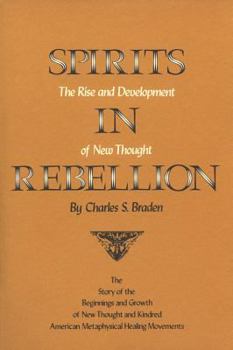Spirits in Rebellion: The Rise and Development of New Thought
Select Format
Select Condition 
Book Overview
Spirits in Rebellion: The Rise and Development of New Thought This description may be from another edition of this product.
Format:Paperback
Language:English
ISBN:0870740253
ISBN13:9780870740251
Release Date:January 1963
Publisher:Southern Methodist Univ Pr
Length:584 Pages
Weight:1.98 lbs.
Dimensions:9.3" x 1.8" x 6.3"
Customer Reviews
5 ratings
AN EXTREMELY ILLUMINATING HISTORY OF THE NEW THOUGHT MOVEMENT
Published by Thriftbooks.com User , 15 years ago
Charles Samuel Braden (1878-1970) was a Methodist Episcopal Church missionary and educator, who was Professor of History and Literature of Religions at Northwestern University from 1926 until his retirement in 1954. He wrote a number of books on comparative religions, such as: The World's Religions, a Short History., and These Also Believe,A Study of Modern Amereican Cults in Minority religious movements. "Spirits in Rebellion" has justifiably been called "the definitive history of New Thought." Braden comprehensively and fairly covers the forerunners of the New Thought movement such as Phineas Parkhurst Quimby (who Braden identifies as "certainly the pioneer in America of the theory of the mental basis of disease") and Warren Felt Evans (whose failure to have founded a movement Braden attributes to the fact that "Evans was clearly not an organization man"), who each have their own chapter, as well as devoting separate chapters to the actual "religions" that emerged from the movement: the Unity School of Christianity, Divine Science, and Religious Science. He notes that New Thought developed in contrast to the "authoritarian" tendencies in Mary Baker Eddy's Christian Science church, and that Religious Science founder Ernest Holmes "did not expect that his writings would crystallize into hard and fast doctrines ... as in the case of Mrs. Eddy's." Nevertheless, "the line of demarcation between the two (i.e., Christian Science and New Thought) is by no means clear and sharp." Braden chronicles the Unity School founder Charles Fillmore's origins from the New Thought movement, but then his "growing dissatisfaction with the movement ... (which) had ceased to express what he thought to be absolute truth." The book ends with chapters on "New Thought Leaders," "Leaders Outside the Movement," and several chapters on "New Thought Abroad." Overall, this is an extremely informative, and highly interesting book for anyone interested in New Thought, Christian Science, Religious Science, Divine Science, the Unity School, metaphysical healing, or New Age ideas in general. VERY highly recommended!
Review of Spirits in Rebellion
Published by Thriftbooks.com User , 17 years ago
We're using this book in Agape ministerial school - U.T.S.L.A. - for our "Emergence of New Thought/Ancient Wisdom" class. As we study these forefathers of New Thought in the book, we also research other information about them - on line, in the library, etc. I must say we don't find much of interest that this book has left out. Mr. Braden is not an especially engaging writer, but he gives you the info, and we're grateful to him for this book.
New Thought History
Published by Thriftbooks.com User , 17 years ago
Braden gets points for the cool title alone! More importantly, he manages to make the material very interesting and readable. I read this book for a class and was surprised to find myself really into it. This is a great book for anyone interested in how "New Thought" came into being, and even anyone interested in religion in general.
re: An historical treasure
Published by Thriftbooks.com User , 18 years ago
Braden's text is a MUST for any serious student of metaphysics. The work delves deeply into the roots of New Thought and chronicles many key churches and movements throughout the United States and abroad. Braden writes with scholarly insight and spirit-led intuition. You won't be dissappointed!
Origins and History of New Thought
Published by Thriftbooks.com User , 24 years ago
This 1963 book provides an invaluable glimpse into the mid-nineteenth century origins, beginning with Phineas P. Quimby, of the New Thought movement in the United States. It describes the careers of the most influential teachers and writers in the various schools and movements, with the exception of the well-known Christian Science church.It is most successful in uncritically informing the reader of the roots of modern New-Age ideas, most of which were expressed more than a hundred years earlier. It is endlessly surprising to discover how little credit most spiritual leaders give to their ideological forbears and how, because of the lack of any coherent organization, a widespread unawareness of earlier discoveries persists.Although the author supplies an apparently comprehensive bibliography to the grateful student, the reader wishes that the text delineated more precisely the specific differences in philosophy among the several teachings, for it is those differences that produced the individual schools and distinct spiritual communities.






